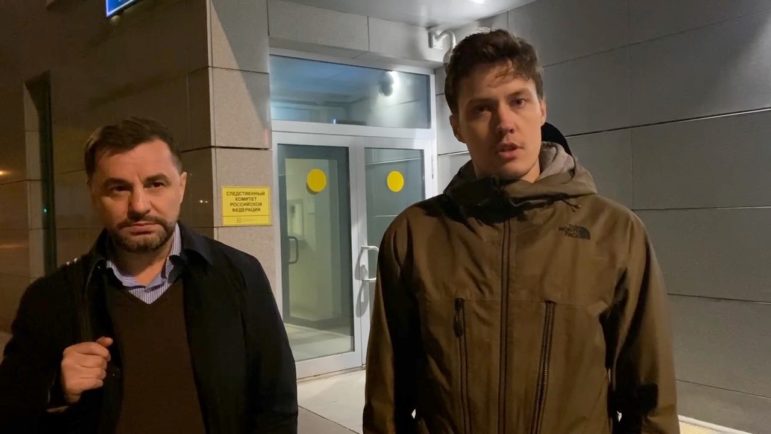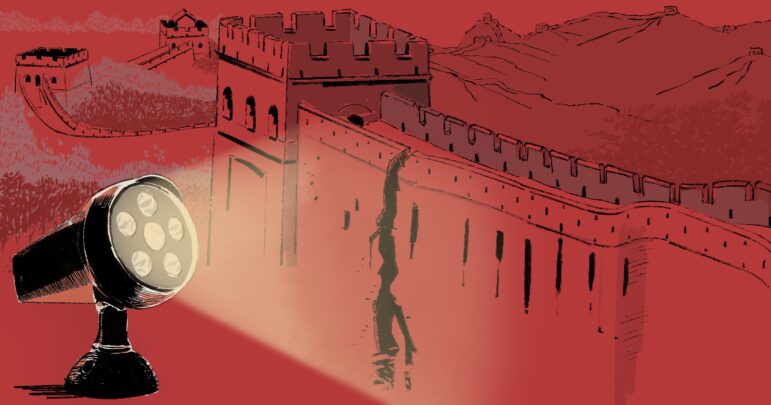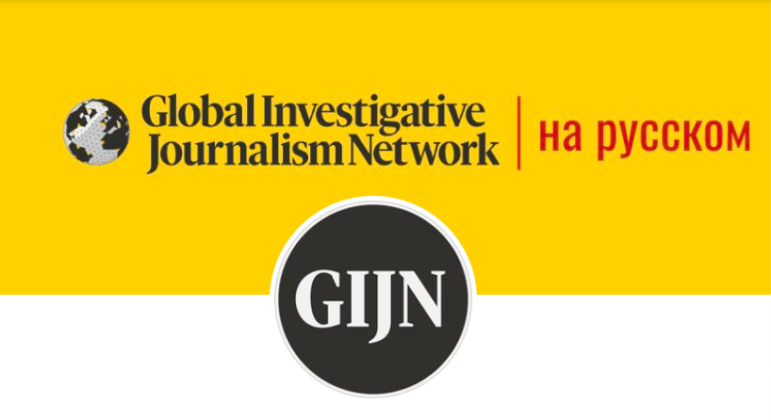

Alsu Kurmasheva, center, and the photograph of her taken when she was still in prison. Image: Diego Figone for IJF25
Silencing the Press: The Case of Alsu Kurmasheva and the Growing Threat of ‘Foreign Agent’ Laws
Alsu Kurmasheva had a method for counting how many days she had been in Russian detention — even as the hours and the days spent in her cell rolled into each other.
“I spent 288 days — 40 Fridays. I counted Fridays because Friday is my favorite day,” she told an audience at the 2025 International Journalism Festival in Perugia. “The first couple of months were brutal. I was still naïve. I was still waiting for that thick metal door with multiple chains and locks to open. For someone to say ‘Alsu this was a terrible mistake, we apologize, you are free to go.’”
At the time a journalist with Radio Free Europe/Radio Liberty (RFE/RL), Kurmasheva was arrested in 2023 while visiting her sick mother in Russia. A joint US-Russian national, she was accused of failing to declare herself a “foreign agent,” and was later convicted, after a secret trial, for “spreading false information” about Russia’s military.
She was sentenced to six years in prison, and would go on to spend nine months in detention, many of them in isolation, before being released in a US-Russia prisoner swap alongside the Wall Street Journal’s Evan Gershkovich.

Alsu Kurmasheva (seated, far right), along with Wall Street Journal reporter Evan Gershkovich (seated, far left), and former US Marine Paul Whelan (second from right) aboard an airplane flying back to the US on August 1, 2024, as part of a historic prisoner swap with Russia. Image: Courtesy of US Government
Longstanding Erosion of Russian Press Freedom
The targeting of the independent media in Russia had begun long before her visit, however. And given the press freedom situation in the country — one of the worst 10 countries in the world to be a journalist, according to the Reporters Without Borders’ 2025 World Press Freedom Index — she knew her trip was risky.
“Going to Russia to take care of my mother was always a battle between my mind and my soul,” she recalled.
But she became convinced her arrest was intended “to stop other journalists doing their job. It was a very clear sign from the authorities — don’t travel, don’t work, don’t cover Russia. Keep the audience there in the dark.”
Can Yeginsu is a lawyer who acted as lead counsel for RFE/RL after the organization was instructed to include the “foreign agent” wording to any piece of content produced. He is also the Media Freedom Coalition’s deputy chair of the high level panel of legal experts on media freedom. He told the audience in Perugia that the use of foreign agent laws “is part of the playbook.”
“These sorts of regimes, the first thing they want to do is cut off sources of funding to journalists and human rights defenders,” he said. “They look domestically and make sure no business is ever going to advertise in a newspaper that is not pro-regime. Then what they do is start tabling legislation against foreign interference. Because they want to cut off funding from abroad.”
“Along the way they pick case study journalists, target them, and create a real stigma around the label they are designating them,” Yeginslu added. “It’s quite clear in all these jurisdictions they are trying to use the language of espionage, shadowy forces, the other — so that you will not be trusted.”
Kurmasheva felt that stigma even in prison.
“I was called an agent. My case was so dangerous to others — prisoners and guards — that nobody talked to me. I was isolated,” she explained. “Everyone was so scared of approaching. We all grew up with those books about the Gulags, everyone knows the risks, you might get an additional charge for interacting with them.”
It was after one particularly gloomy hearing, when she realized she would miss Christmas and New Year with her family, she started to approach her detention differently.
“I realized I had to use my skill as a journalist to try to connect to people in prison, to the guards,” she said. “I came back to that dark cell and looked at things differently. Yes, it was a horrible cell, but there were people there and not all of them were criminals. I tried to connect.”
Then at her next court hearing she did her best to make sure her voice was getting out.
“The court room was packed — local journalists who didn’t dare ask me anything, they were just filming and taking pictures. I stood up and said: ‘Do you want to ask me anything?’ Nobody said anything but I realized I had a minute or two before the judge came back with the ruling… So I talked about my conditions. That video made a big difference. It was the first time my family heard my voice,” she said. “Once a journalist, I think you can’t stop being a journalist. I’ve always enjoyed my profession, and it helped me to get free.”
Inside her cell, she saw how the diaries of the other women were taken away, so she came up with a system for recording what was happening, a code made up of initials, numbers, emotions.
“I tried to write as many letters as I could to tell the story about me. Sometimes I had to be creative — that’s another journalistic skill when there is censorship, you have to be creative. Sometimes I would write not about myself but some TV show I saw. Or about a book I read. My friends would figure out that I was… telling my story from inside the prison.”
She also learned to read clues in what was happening around her and how she was being treated. A newspaper she was allowed to subscribe to would take a long, long time to be delivered. One day she spotted it on the desk of one of her guards: “Instead of being mad I was so happy they had access to good quality information, through me at least.”
Sometimes the conditions she was kept in would get worse, she would be sent to an isolated cell, with no hot water. “A couple of days later I would receive a visit or a letter… an important statement was made in the US or Europe [about her case].”
Then one Saturday morning, with no warning, she was given 10 minutes to pack her belongings. She was told she was going “to a very different location,” initially a terrifying prospect, but was taken to Moscow and flown out of Russia. “I’m so grateful, every morning, every day, to lawyers, advocacy organizations, every journalist who kept my name and case in the spotlight,” she said.
Growing Risk
Antonio Zappulla, the CEO of the Thomson Reuters Foundation and moderator of the panel, said foreign agent laws are “being weaponized by autocratic regimes to essentially silence dissent.”
The laws, he said, “are designed to weaponize law and to silence media freedom in different ways… [with] very harmful consequences for people and democracy.”
Yeginsu said that while the origins of the foreign agent laws in Russia began in 2012 — with an initial target of non-governmental organizations, then lawyers — the target moved to reporters and media organizations soon after. The associated fines and potential criminal sanctions for those breaking the rules “just got worse and worse all the time,” he said.
The alarming trend, he added, is the speed in which similar laws are being proposed and enacted in other countries. He said Turkey, Hungary, Nicaragua, Venezuela, Georgia, and Paraguay have drafted bills or proposed new legislation that mirrors elements of Russia’s foreign agent laws in recent years.
“The spread is incredible and very worrying,” he said. “Countries are moving very, very quickly. Russia, Nicaragua have got quite a lot of press… others have had very little.”
“You are going to start seeing foreign agent laws in Italy, the UK, and other countries. Illegitimate foreign influence is an issue — just like disinformation is an issue — but rather than saying there can’t be any legislation, we need to look at it very, very closely, and ensure it’s being deployed to combat legitimate aims,” he warned. “Vague legislation is always misused.”
Kurmasheva was released in August last year, but said she remembers everything about her detention. “It’s been eight months since I was released. I don’t forget a thing, I remember everything… Maybe it’s not good, maybe I should talk to the therapist. Maybe forget some things. Those things will stay with me forever.”
She called on the audience to remember other reporters currently in jail in Russia, and to continue to fight for their release.
“At this point, at this stage of life, I don’t like the word hope,” she said. “I like strategy and I like planning. When there is no strategy, hope is kind of hopeless.”
Editor’s note: In December 2023, the Russian government labeled GIJN an “undesirable” organization. Read our statement in response.
 Laura Dixon is a senior editor at GIJN, based in the UK. She has reported from Colombia, the US, and Mexico, and her work has been published by The Times, The Washington Post, and The Atlantic, among others. She is a former staff reporter of The Times in London, and has received grants and fellowships from the IWMF, the Pulitzer Center, and Journalists for Transparency.
Laura Dixon is a senior editor at GIJN, based in the UK. She has reported from Colombia, the US, and Mexico, and her work has been published by The Times, The Washington Post, and The Atlantic, among others. She is a former staff reporter of The Times in London, and has received grants and fellowships from the IWMF, the Pulitzer Center, and Journalists for Transparency.









